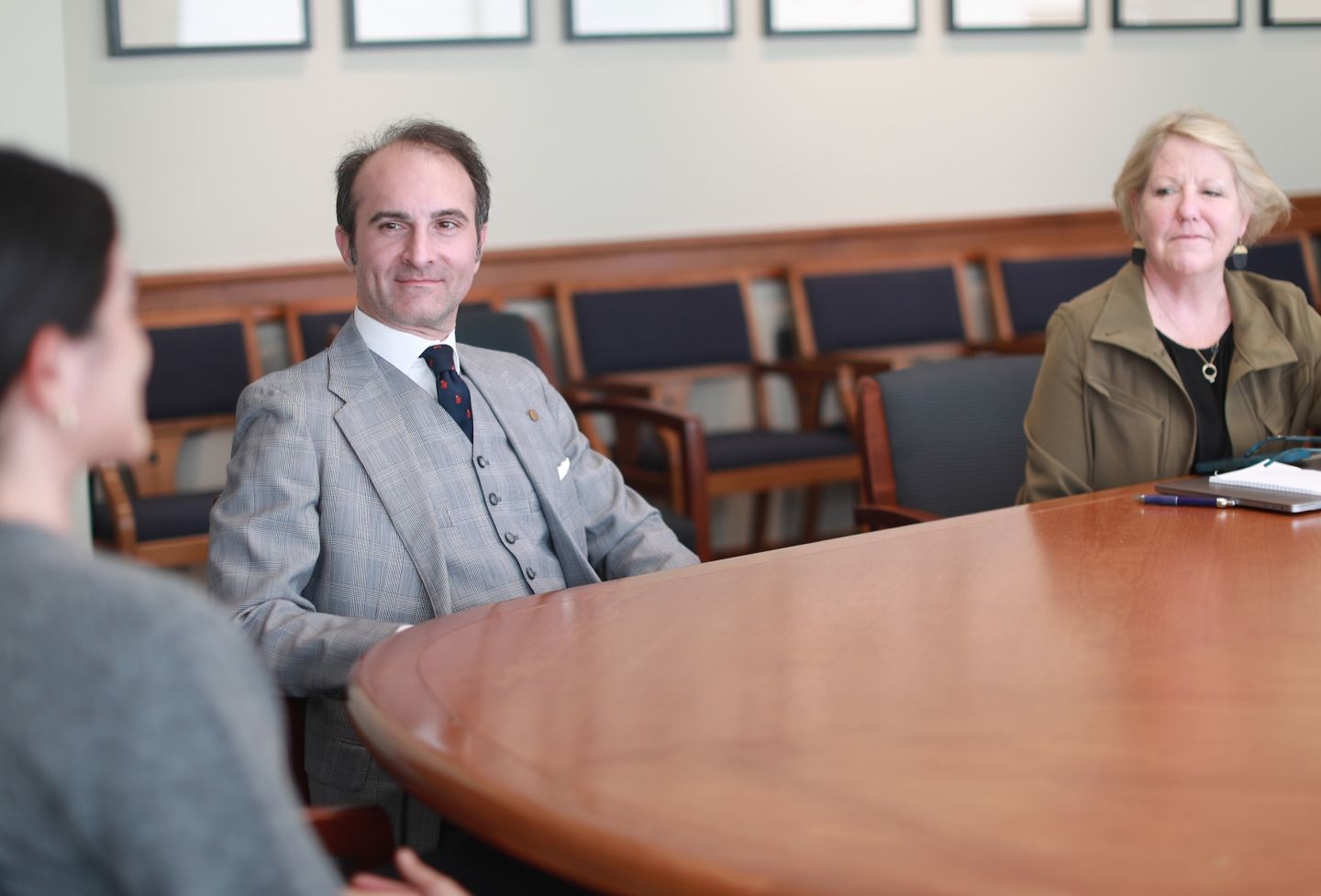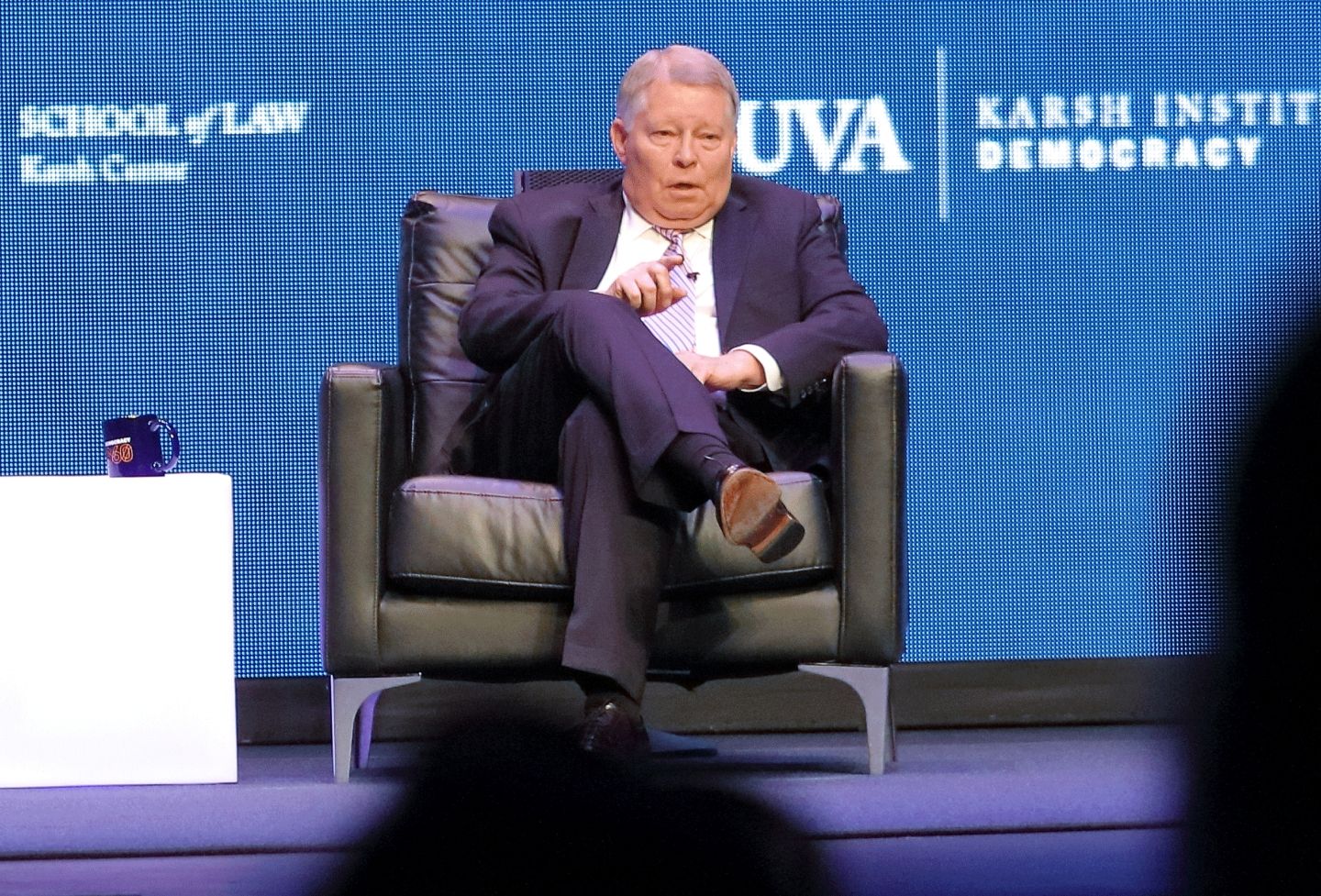Watching Risa Goluboff work a reception reveals a master at her craft. There are the funny anecdotes, active listening, usually some animated gesticulating and facial expressions that no photographer can do justice, and always, always — as she makes her way among different pockets of those gathered — moments where she is beaming with pride.
Yet it’s the work she does behind the scenes as dean that explains how Goluboff has made her mark over the past eight years, carrying the Law School through unforeseen challenges and steering the 205-year-old institution to many remarkable successes. Her optimism, coupled with a drive to make the school even better, has motivated those around her to happily carry out marching orders or find solutions.
“She’s a force of nature, and as a dean, she was that — she led with vision,” said Leslie Kendrick ’06, who worked with Goluboff as vice dean and is preparing to step into the dean role herself on July 1. “But she’s also very collaborative. She gets other people excited in her projects and she listens to other people about what needs to be done and what would make the Law School a better place. She brings so much enthusiasm to everything she does, and that is completely infectious.”
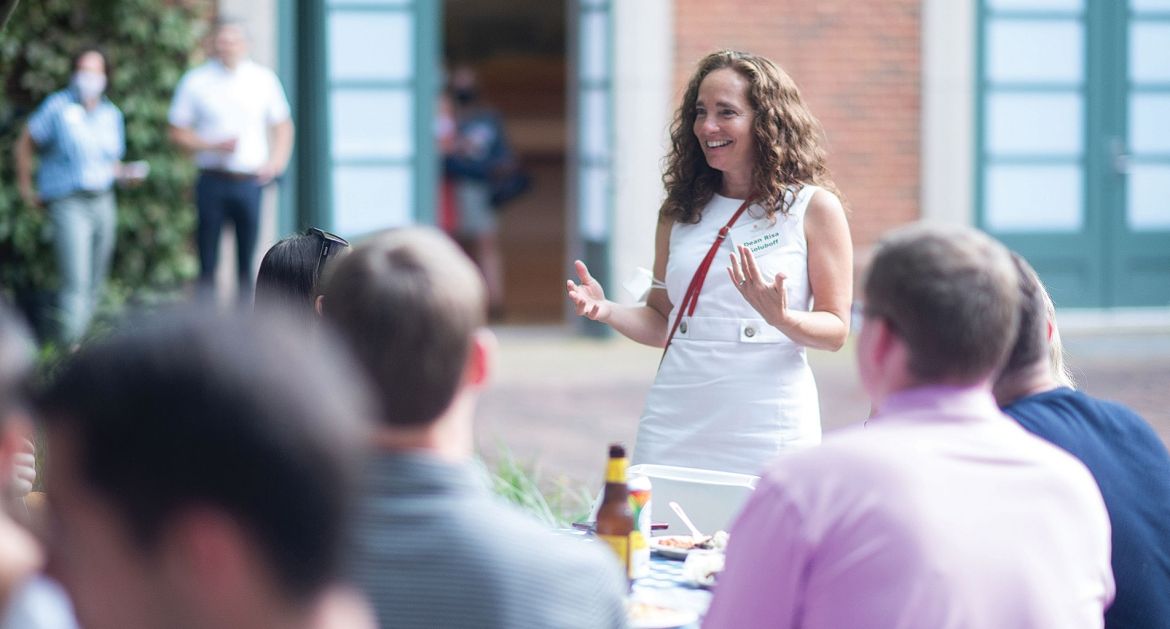
That vision included extolling and enhancing Virginia’s famously collegial culture and beating the drum for faculty research, recruiting a large wave of professors, adding clinics, building robust intellectual centers, and creating a program to help low-income and first-generation undergraduates progress to law school and the legal profession — all while launching the Honor the Future capital campaign and exceeding its $400 million goal 15 months early.
“All the things that you think of the University of Virginia Law School standing for, she has made it happen,” said J. Warren Gorrell Jr. ’79, who co-chaired the capital campaign. “We’ve been blessed to have a long line of fantastic deans, and Risa has just continued that and more.”
Stepping Into the Spotlight
A third-generation Brooklynite, taking on new challenges has been part of Goluboff’s DNA since her youth, when her interests outside of school included everything from debate to dance to theater to at least one venture into an unlikely sport. A take-charge kid willing to test her mettle, she joined the boys’ wrestling team in ninth grade and found it advantageous to be able to compete in the 89-pound weight class.
“I like to be busy,” she laughed. “I have a lot of energy.”
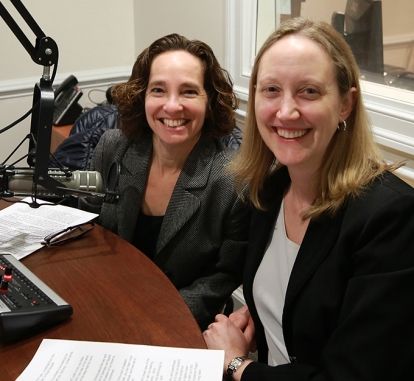
Intellectually, those years also grew her interest in civil rights issues, as racial conflict around New York City — such as in Howard Beach and Crown Heights — brought conversations about race to the fore in her high school, St. Ann’s.
She studied history and sociology at Harvard University, eventually earning her M.A. and Ph.D. in history from Princeton, and her J.D. from Yale Law School. Following clerkships with U.S. Judge Guido Calabresi and Supreme Court Justice Stephen Breyer, she went on the teaching market, where she was impressed by the approach of her Virginia interlocutors.
“UVA’s was the interview at which the faculty interviewers combined generosity with rigorous inquiry, as well as a breadth of perspectives,” she said. “They challenged me and each other with respect, and from every possible intellectual perspective — and they have been doing so ever since.”
After joining the faculty in 2002, she wrote two award-winning books focused on constitutional law and civil rights — “The Lost Promise of Civil Rights” and “Vagrant Nation: Police, Power, Constitutional Change, and the Making of the 1960s” — and collected a number of other honors: UVA’s All-University Teaching Award, a Guggenheim Fellowship and a fellowship from the American Council for Learned Societies.
Though her focus was on scholarship and teaching before becoming the first woman to serve as dean of the Law School, she smoothly transitioned into leadership. Kendrick, who had worked for Goluboff as a research assistant when she was a first-year law student and Goluboff was a first-year professor, had an inkling that her mentor would soar as the school’s manager-in-chief.
“Risa is someone who is just a natural mentor and supporter to everyone who’s around her,” Kendrick said. “When she is taking on work, she’s always working harder than everybody else, but bringing everyone else in, in ways that make it really meaningful for them.”
Goluboff said her goal “was to make us the best version of ourselves that we could be.”
Long impressed with UVA’s “vibrant intellectual community,” she looked for ways to share the faculty’s ideas more widely with the world at large. She joined Twitter and Instagram, and launched a podcast with Kendrick focused on faculty research, “Common Law,” allowing her to celebrate the many strengths of the school in a more public way. She also encouraged professors to join Twitter, now X, and the school’s faculty became among the legal academy’s most prominent in the space.
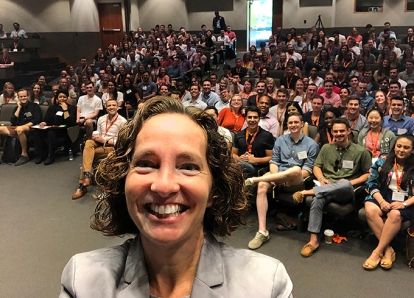
“We live in a time when it’s hard to get people’s attention, and it’s hard to figure out what are the best avenues for our faculty to reach different audiences with what is truly groundbreaking and path-breaking work,” she said.
The faculty Twitterverse took note when Goluboff led a hiring spree that caught fire during the pandemic. She led efforts to recruit 38 faculty members, including prominent lateral hires, early career talent and experienced clinical professors. Among the faculty joining the school were one of the foremost theorists on originalism (Lawrence Solum), a prominent leader in trade secrets (Elizabeth Rowe), an internationally renowned scholar on sovereign debt (Mitu Gulati) and many more (see “By the Numbers” sidebar, below).
“We were incredibly fortunate that, thanks to the generosity of our alumni, we were in a financial position that a lot of schools were not in, to be able to hire during COVID,” she said.
Goluboff said that the new faculty are not only “terrific” scholars but also deeply committed to the school’s long tradition of exceptional teaching, a lineage exemplified by the 19 UVA Law professors who have received the All-University teaching award since 1996.
“As we have tried to elevate the impact and visibility of our faculty scholarship, we also wanted to preserve our faculty’s legendary commitment to teaching and to being fabulous teachers.”
Harnessing Growth
Goluboff, Kendrick and current Vice Dean Michael Gilbert helped organize and launch 13 new centers to showcase areas of excellence within the faculty and to facilitate collaboration among them and with external scholars. The new centers include the Virginia Center for Tax Law; the Program in Law, Communities and the Environment (PLACE); the LawTech Center; the Center for Public Law and Political Economy; the Education Rights Institute; and the Family Law Center. The Law School also reorganized other programs to better connect with Virginia’s faculty expertise.
“These centers bring more people to the Law School for convenings and events of all kinds,” Goluboff said. “They enable the outside world to better see where our strengths lie and the impact we are having on the world.”
The faculty hires and research promotion dramatically improved the law school’s ranking on multiple measures of academic impact.
In a shift that began before her tenure, the curriculum also progressed toward a more even mix of lectures, seminars and clinical courses, and away from a reliance on traditional large lecture classes.
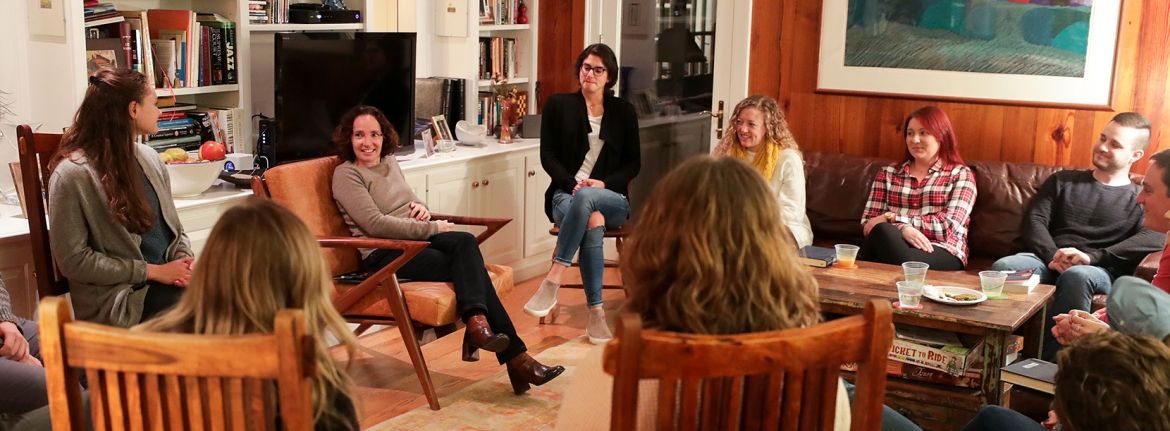
“To make the kind of UVA lawyers that we want to put out there in the world, students need the doctrinal fundamentals, the building blocks of how to think like a lawyer,” she said. “And they also need the practical experience to hit the ground running, and then they need the theoretical perspectives and the deep dives into particular subjects that really let them see the big picture.”
As part of that transition, Goluboff added nine full-time clinical professors to the six who were on the faculty when she became dean, plus eight new clinics, bringing the total to 24.
“People often don’t recognize how resource-intensive practical and experiential education is, especially clinics,” she said. “They’re incredibly valuable, and they are worth the resources that we put into them. It is not just that they provide essential practical experience. It’s also that they help us fulfill our mission as a law school — and especially a public law school — to serve the public and enable our students to engage in public service.”
Goluboff also increased support for students seeking public service careers. During her tenure, the school added public service counselors, hired a full-time faculty member to run the Program in Law and Public Service, guaranteed and increased funds for public service summer fellowships, created scholarships for students interested in public service, provided funding for public service callback interviews, initiated an annual public service conference and expanded the Loan Forgiveness Program.
“Because we’ve added more support for public service, more and more students are coming to the Law School because they know it’s a place that will support their public service career,” Goluboff said. “Our goal is to help enable — financially, pedagogically and professionally — every student who wants to do public service.”
The school also added career counseling positions for private practice and clerkships, supporting a best-in-class operation that trains all students not only on how to succeed at their job search, but how to become full professionals.
The investment has paid off: In addition to The Princeton Review ranking the school No. 1 for Best Quality of Life every year of Goluboff’s deanship, the Law School is in the top 5 for Best Career Prospects, Best Classroom Experience, Best Professors and Best for Federal Clerkships. According to American Bar Association data, the school has also been No. 1 for the past two years in the percentage of graduates obtaining full-time, long-term jobs that require bar passage, considered the gold standard for measuring law graduate employment. The school is No. 4 in the percentage of graduates from the classes of 2021-23 going directly to federal clerkships after law school, and five UVA Law alumni from the Class of 2021 were selected as clerks by U.S. Supreme Court justices, tying a school record set by the Class of 1981.
The school’s footprint also became more global. Four new student exchange programs and three new faculty exchanges across three continents are giving students opportunities to learn and faculty to teach and do research abroad. Students are also taking shorter trips with help from faculty: Professor Camilo Sánchez, whom Goluboff hired to direct the International Human Rights Clinic and co-direct the school’s Human Rights Program, has taken students to Argentina, Nepal, Kenya, Colombia and Geneva, Switzerland, among other far-flung locales, for classes and research over the past few years. Professor Ruth Mason advises the student International Tax Moot Court Team, which has traveled to Belgium to compete in final rounds several times — and won three times.
After ‘Charlottesville’
When white supremacists descended on Charlottesville for a weekend in August 2017 to protest the removal of Confederate statues, many anticipated something like a typical KKK protest — abhorrent views aired in a nonviolent manner. Instead, community members witnessed a torchlit march down the Lawn and an attack on University and local community members who were surrounding Thomas Jefferson’s statue on Aug. 11.
Goluboff sent a message on Aug. 12 to the Law School community condemning the previous night’s violence, just hours before Heather Heyer was killed by a Unite the Right supporter in downtown Charlottesville. Goluboff spent the following days reassuring new students and their families that this was not the norm for the famously welcoming college town, which had recently been named the “happiest city” in America by the National Bureau for Economic Research.
The shocking events raised many questions.
“How did they get to be here? How was it that they needed a permit to use a city park but there were no policies in place that required informing the University of their plans? It turned out I would spend the year answering those questions,” she recalled.
University President Teresa Sullivan, who had announced months earlier she would be stepping down from leadership, appointed Goluboff to chair the Deans Working Group. The group analyzed what went wrong and recommended new policies, processes, programs and investments to prevent future violence. They also set a path to enable the University to reckon with its history and live its values for the future.
“She was just superb” in leading the group, said Frank M. (“Rusty”) Conner III ’81, who was then serving as UVA’s rector. “That group worked very hard, in relatively short order. They brought the University back to a level where the community had trust in the future of the organization and had trust in its leadership.”
Within a month, the group released a report — on Sept. 11, 2017 — that included a timeline of events on Aug. 11 and an assessment of the University’s response to the events.
The University later adopted many of the group’s recommendations, including improving safety and security; developing time, place and manner policies to govern First Amendment activities in University common spaces; increasing funding for faculty hiring, scholarships and efforts to build bridges across differences within the University community; and following up on recommendations made by the group’s Advisory Committee on the Future of the Historic Landscape.
At the Law School on Aug. 11-12 and in the days after, Goluboff admired the way students, faculty and staff rallied to support worried new students, inviting them to their homes or just meeting with them to provide comfort. Among the new students in town were the first class of Community Fellows, a program designed by Goluboff and Assistant Dean of Student Affairs Sarah Davies ’91 and her office to bolster a sense of collegiality and mutual respect and to enhance the free exchange of ideas among diverse 1Ls.
“One of the things that was really heartening was the support that every member of our community gave other members of our community and the larger Charlottesville community,” Goluboff said.
Though Goluboff had long made it a goal to ensure that all students felt a sense of belonging at the Law School, the protests over race and policing in the summer of 2020 intensified her commitment to increasing access for students from all backgrounds, identities and viewpoints, and building an environment where every member of the community can thrive and engage. During her tenure, the school recruited its most academically accomplished and most diverse classes in its history.
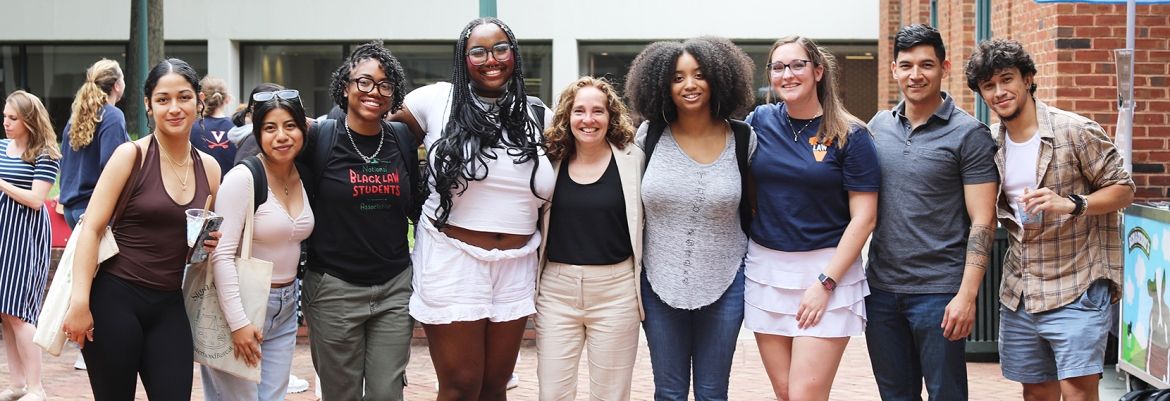
In 2022, with help from Mark C. Jefferson, whom she hired from Harvard Law School to be the school’s new assistant dean for community engagement and equity, the Law School launched the Roadmap Scholars Initiative, which provides extensive financial and academic support to low-income and first-generation undergraduates seeking a path to an elite legal education. During the participants’ final two years of college, the program exposes them to law school classes, prepares them for the LSAT, and provides mentors and internships. Students receive stipends for two summers to help them offset lost income.
“The stipend is important because without it, a lot of our first-generation students, if not all of our first-generation students, wouldn’t be able to come,” Jefferson said, adding that it’s the most comprehensive and generous program in the country — thanks in large part to Goluboff.
“It was her idea,” he said. “We worked shoulder-to-shoulder to put it together. There’s no part of the program that she hasn’t been hands-on with in terms of trying to help think through, and providing creative and critical feedback and insight on how to structure it.”
Jefferson said Goluboff has taken the lead in encouraging faculty members to participate, securing summer internships with alumni and raising the “extraordinary gifts that we’ve gotten.”
“This is in many ways, Risa’s program,” he said. “I feel very lucky to have been able to help bring her vision to life.”
Goluboff, who taught constitutional law to Roadmap Scholars the past two summers, said she is excited to see where the students go.
“We are a more accessible and diverse place along lots of different dimensions, and I think the Roadmap Scholars Initiative is a big piece of that,” she said. “It’s both emblematic of our goals of being accessible, and an accelerator for achieving those goals.”
As she laid a path forward for a new generation of students to succeed in the profession, Goluboff-the-historian worked with the Law Library and others around Grounds to better understand and document the Law School’s full history by supporting oral histories and archival resources, and contributing chapters to a forthcoming book about that history.
She also honored trailblazers who paved the way for the diverse student body at the Law School today. In 2018, the school established the Gregory H. Swanson Award, given to students in honor of the first Black student to attend the Law School and UVA. In 2022, the school commemorated Elaine Jones, who became the school’s first Black female graduate in 1970, with a scholarship in her name.
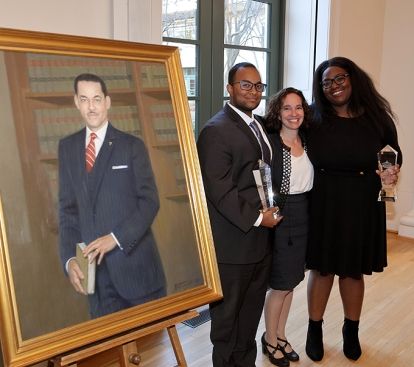
Swanson’s daughter, Karen Swanson, attended the 2018 event honoring her father, during which Goluboff gave the first Swanson Award. She hailed the dean’s stewardship of his legacy.
“[Goluboff] brought his story to life — it was an American history story, and she felt it was worthy of recognition,” Karen Swanson said. “What may have been a small piece of history kept well within a certain community, Dean Risa’s effort made global.”
Swanson said the portrait, which grade-schoolers have visited on field trips exploring civil rights history, provided a great deal of comfort to her family, including her mother, Betty Swanson, who is now 93.
“It gave me a glimpse of his history before he met my mother, before he became my dad,” Karen Swanson said. “I don’t think I can find an adequate way to thank her for her kindness, her intellect, her heart, because she didn’t have to do this. But she did it, and she did it well.”
Goluboff’s efforts to honor more stories and people from the Law School’s past have represented a “transformative change” for the UVA Law community, according to Ashanté Smith ’02, a partner at Troutman Pepper and a member of the Law School Foundation board of trustees.
“She’s reimagined the art and artifacts that represent our Law School history to make sure we’re telling a more vibrant and complete story of our legacy,” Smith said. “That is change we can all be proud of — and change that will be an indelible part of her legacy.”
In doing so, Smith said, she transformed the relationship many alumni have with the Law School and larger University.
“I’ve always felt like UVA was my second home, but during Risa’s tenure as dean, that affinity deepened in ways I never imagined,” Smith said. “Risa has also made others feel welcome to return home and meaningfully reengage with the Law School.”
An Unprecedented Challenge
It was hard enough for the Law School to move 139 courses online in the span of eight days over spring break in 2020, as the COVID-19 pandemic began. In the fall of 2020, the school chose what many educators viewed as the hardest path forward: hybrid learning.
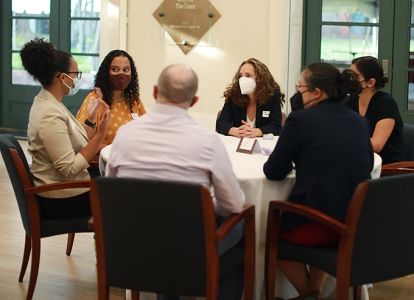
Goluboff’s decision to offer both in-person and online classes aimed to preserve a sense of community while protecting the health of its people. The Law School had a size advantage — large event spaces like Caplin Auditorium, the Purcell Reading Room and Caplin Pavilion could be converted to allow for sizable classes in which masked students could sit 6 feet apart. At the same time, any student who wanted to take classes completely online could do so, and professors could teach in their preferred format.
But transitioning the school to this new way of teaching wasn’t a simple task. It meant an overhaul of the school’s sound systems, installing individual desks for formerly empty event spaces, and adding plexiglass partitions, custom podiums and new monitors for professors to see online learners.
“We moved heaven and Earth so that we could be hybrid and maintain our core values,” Goluboff said. “One of the things I learned is, things might seem impossible, but they’re not usually impossible. They just require a lot of work.”
The hard work paid off: 90% of 1Ls and 70% of all students took at least one class in person during the fall of 2020, and the Law School and library remained open. Still, the arrangement posed many challenges as the school continued to seek input and adapt to the disparate needs of different parts of the Law School community.
Goluboff hosted a series of online meetups with staff, as well as with students, section by section. As restrictions relaxed, she welcomed community members to her own backyard for gatherings and meals. Photos from her social media accounts in that era captured distanced gatherings — guests were sitting 6 feet apart but, importantly, they were sitting together.
“We wanted to continue to provide the best education we could to our students and develop new ways to connect and maintain our culture,” Goluboff said.
David C. Burke ’93 said Goluboff “provided us with a vision during a period of unique challenges.”
“Risa is the rare individual who combines an extraordinarily warm, caring and genuine personality with the most elite of academic credentials and a selfless approach to ensuring the institution will continue to thrive,” Burke said.
Navigating a New Era
As Goluboff and other administrators were holding the community together while wrestling with the COVID threat, they also dealt with the more intangible challenges posed by a notable increase in polarization nationwide.
“We’ve worked hard against a lot of headwinds to continue to be a really big tent,” she said. “People often describe the free exchange of ideas as being at odds with being a diverse place along multiple dimensions — that’s not my view. The faculty, students, staff and alumni of this law school are both heterogeneous in every way, and a real community. That combination is what makes us special.”
Goluboff pointed to community bonds as being integral to overcoming polarization — knowing classmates from small sections, from softball, from the Libel Show “enhances the free exchange of ideas” and “actually enables you to have the hard conversations,” she said.
Gorrell, who attended law school during an era of different controversies in the 1970s, said it was notable how Goluboff has managed the Law School amid such national division.
“She makes everyone feel good about being a part of the Law School, which is a really hard thing to do in academia today — actually, in our country,” Gorrell said. “She’s made sure that we have all different perspectives represented in the student body and the faculty. And she’s encouraged a continuation of pluralism and freedom of expression and — not just tolerated it — encouraged it and made it work. That’s one of her unsung incredible contributions to the Law School.”
Goluboff said it works because UVA Law students spend time nurturing the school’s diversity and pluralism, and their relationships with each other.
“I have been so impressed with our students, time and time again, as I have witnessed their friendships across political and ideological lines and how much they appreciate and learn from one another,” she said. “They recognize that these relationships and interactions are a special and yet very vulnerable thing that they have to intentionally nourish and foster.”
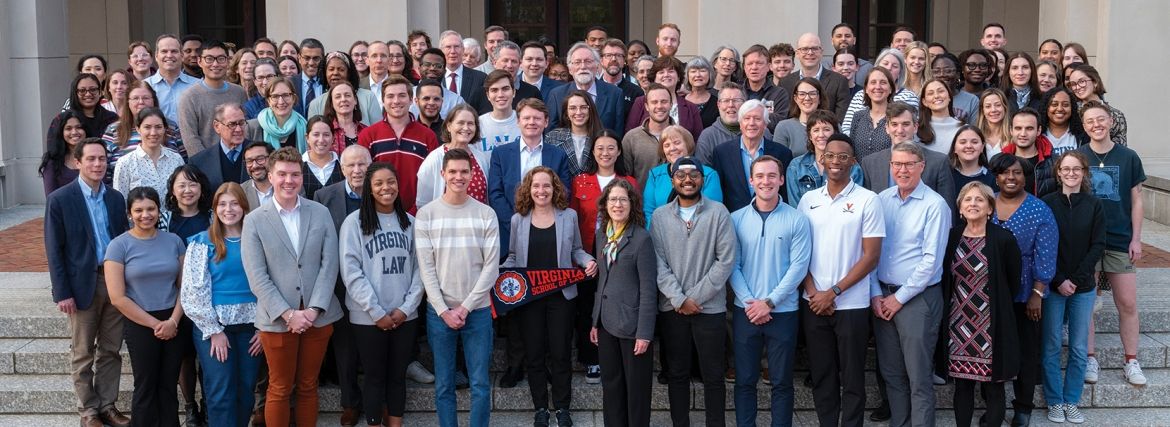
An Advocate for UVA
In her last year in office, Goluboff has continued to build connections outside the school to strengthen Virginia’s reputation. Describing herself as a “both/and person,” Goluboff admitted she sometimes takes on more than her schedule might appear to allow, but always finds a way to make it work. She taught throughout her deanship, viewing it as a crucial way to connect with students.
She also prioritized University service, not only on the Deans Working Group, but also in chairing the search committee for the vice provost for enrollment and serving on committees dealing with topics ranging from research infrastructure to strategic plan implementation.
“There’s a saying that if you want something done, ask a busy person. Risa is that person,” UVA President Jim Ryan ’92 said. “She has approached each of these assignments with extraordinary thought and care, not to mention warmth and humor. When you consider all she’s accomplished for the Law School on top of that — plus her own writing and scholarship — it’s astounding. Risa has been an invaluable contributor to this community, and she is someone I deeply admire as a leader and as a person.”
Goluboff also has worked to build relationships, through both formal and informal means, with deans across the country, including former Harvard Law School Dean John F. Manning, who recently became Harvard’s interim provost.
“Risa has been a terrific dean of a great law school and has led with wisdom, creativity, and integrity throughout her deanship,” Manning said. “I have been grateful for her friendship and good counsel during the time we have served together as deans.”
Goluboff played a critical role in organizing her fellow law deans as the inaugural chair of a deans’ advisory board to U.S. News and World Report, and has recently joined the executive committee of the Association of American Law Schools and the board of Equal Justice Works, which funds postgraduate public service law fellowships across the country.
During her deanship, Goluboff has also continued to engage as a scholar and is currently working on a book about the legal history of the events of Aug. 11-12, 2017. She was elected to the American Academy of Arts and Sciences and the American Law Institute, was selected as a distinguished lecturer for the Organization of American Historians, and was appointed by President Biden to serve on the Permanent Committee for the Oliver Wendell Holmes Devise, through which she will help document the history of the U.S. Supreme Court. A former recipient of a Guggenheim Fellowship, she has also joined the board of the John Simon Guggenheim Foundation.
In October, Goluboff was named chair of UVA’s Karsh Institute of Democracy advisory board. The institute, which regularly draws notable figures such as Judge J. Michael Luttig ’81 to the University for events and engagement, was established with a $100 million investment in 2021 with founding support from Law School graduates Martha Lubin Karsh ’81 and Bruce Karsh ’80, who previously funded the Law School’s Karsh Center for Law and Democracy.
“Martha and Bruce have been transformative in this campaign and to the University as a whole,” Goluboff said. “It has been a privilege to get to know them and to share their vision of how to enhance the Law School, the University and our democracy.”
The Karshes, in a joint statement, said the feeling was mutual, noting that Goluboff was not only “brilliant and accomplished, but also distinguished by her strength of character, integrity and ethics” and her “irrepressible sense of humor and optimism.”
“When we first met Risa in 2018, we knew instantly that she was special. It was all of her qualities that inspired and motivated us to increase our support for the Law School,” the Karshes said. “Risa was our partner and adviser in imagining and building both the Center for Law and Democracy at the Law School, and the pan-University Institute of Democracy, as well as funding merit scholarships and professorships at the Law School.”
The couple helped launch the Law School’s Honor the Future campaign with a gift that made them the school’s first $50 million donors, funding the center’s efforts, the full-tuition Karsh-Dillard Scholarships and faculty professorships. The campaign, in which 70% of alumni have participated thus far, has put people, not capital projects, first — with a focus on scholarships for students, support for faculty and unrestricted funds. During Goluboff’s deanship, the school’s endowment has grown 76%, to more than $831 million today.
Goluboff said she was grateful to all the alumni she’s connected with during her deanship.
“One of the best things about leading this institution is the affection and enthusiasm our alumni have for this place that I get to witness — and relish,” she said.
Even as Goluboff’s role at the Law School transforms again, she will continue to beam with pride, reflecting the feelings Virginia’s graduates have long had for their alma mater.
By the Numbers: Dean Goluboff’s Tenure
Through June 30, 2023, except where noted
Fundraising and Alumni Loyalty
- 76% growth in endowment, to more than $831 million
- $415 million raised in the Honor the Future Capital Campaign, which will end June 30, 2025
- 70% of alumni have contributed to the campaign
- $4.7 million in gifts, pledges and expectancies on average per month
Students and Academic Life
- 71% increase in spending on student scholarships
- 6.4 to 1 student-faculty ratio in fall 2023 (9.7 to 1 in fall 2015)
- 8 clinics added to the curriculum
Supporting Public Service
- $22.4 million spent on public service fellowships and scholarships, loan forgiveness, the Public Service Center, and the Law and Public Service Program
- 53% increase in spending on summer public service grants
A Generation of Graduates
- 3,000+ degrees awarded since July 2017 (expected through May 2024)
- 55% increase in graduates’ median salary
- 703 total clerkships, 632 at federal courts and 10 of those at the U.S. Supreme Court
Faculty Hires
Alice Abrokwa, Payvand Ahdout, Scott Ballenger ’96, Rachel Bayefsky, Andrew Block, Jay Butler, Naomi R. Cahn, Danielle K. Citron, Kevin Cope, Kristen Eichensehr, Thomas Frampton, Amanda Frost, Alison Gocke, G. Mitu Gulati, Juliet Hatchett ’15, Cathy Hwang, Edwin “Eddy” Hu, Annie Kim ’99, Craig Konnoth, Kimberly D. Krawiec, Chinh Q. Le ’00, David S. Law, Karen Moran, Joy Milligan, Moira O’Neill, Kelly Orians, Richard M. Re, Gerard Robinson, Kimberly J. Robinson, Bertrall Ross, Elizabeth A. Rowe, Karoline Homer Ryan ’92, Camilo Sánchez, Lawrence B. Solum, Megan T. Stevenson, Crystal Shin ’10, Sarah Shalf ’01, Xiao Wang
(through June 2024)

